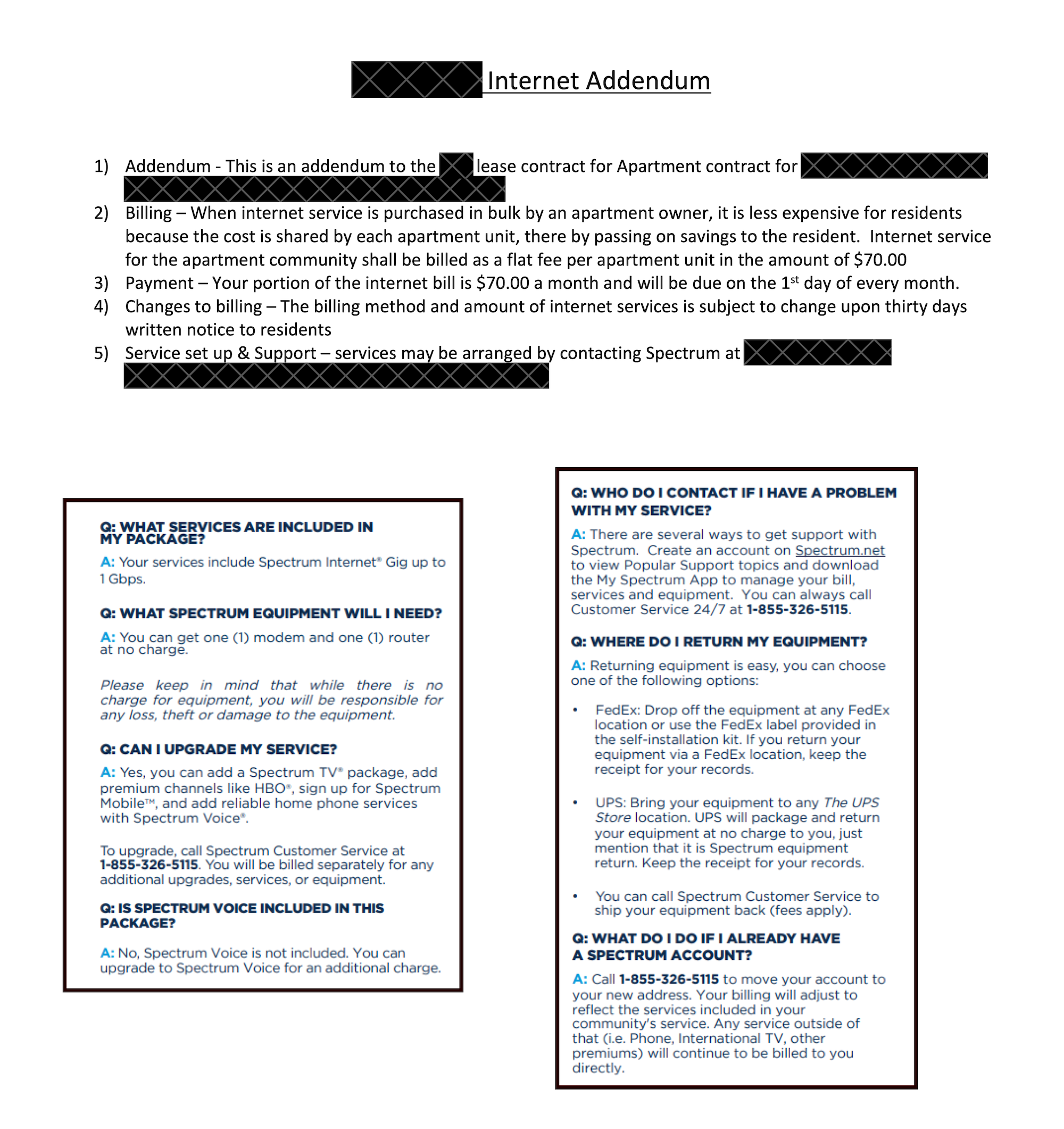Cable can't compete with 5G home internet, so it's cheating
I'm forced to pay for Spectrum cable internet, and I'm not the only one.

I renewed the lease on my apartment last month, which came with a new monthly charge: $70 per month for internet access. I was confused, because I had previously paid for my internet service directly through the provider company, but now it's bundled in my rent agreement with no opt-out mechanism. I'm stuck with an expensive Spectrum plan until I move out, unable to switch to 5G-based competitors (or landline options if there were any), and I'm not the only one.
Let me rewind a bit. I moved to an apartment complex in Raleigh, North Carolina in early 2021. Initially, there were two options for internet: DSL service through AT&T, and cable internet through Spectrum (owned by Charter Communications). Most Americans have one single option for land-based internet. I tried AT&T's DSL first, but it was dropping out constantly, so I signed up for Spectrum internet a few months later. There were a few packages available, and I chose the 400 Mbps tier, with an initial promotional price of $30 per month. That promo was supposed to end after two years, then cost $65/mo.
Spectrum's internet service has been mostly reliable, and it was extremely cheap during that initial promo period. Two renewals later, the Spectrum internet was now a required part of my apartment lease. It's gigabit internet and not the 400 Mbps I previously selected, but it's a higher fixed price of $70/mo, subject to change at any time with only a 30-day warning.

Apartment complexes and other communities signing exclusive deals with Spectrum is not a new practice, and the arrangements aren't all the same. I found one person at the Day Heights Meadows community in Ohio, who in January 2023 was switched to a bulk Spectrum package with both 500 Mbps internet and a basic TV package. One other person complained that their apartment in Florida included Spectrum internet with no opt-out, with speeds that dropped from the promised 800 Mbps to 0.31 Mbps on a regular basis. The only fix they had was splitting the cost of a Verizon 5G router with a roommate, but that was also too slow to be usable most of the time.
The document provided in my lease tries to spin the forced bundling as a way to lower prices, saying, "When internet service is purchased in bulk by an apartment owner, it is less expensive for residents because the cost is shared by each apartment unit, there by passing on savings to the resident." This appears to be technically true, as determined by plugging the building across the street into Spectrum's signup page, which lists gigabit as costing $60/mo for the first 24 months and then reverts to $120/mo. Supposedly, it's easy to convince Spectrum support to renew that promotional price, but I can't do that because my lease renewal makes the price non-negotiable.
The new competition
These types of agreements aren't anything new, but what is new is that cable companies in the United States have real competition for the first time in decades. All three major cellular networks now sell 5G home internet services (sometimes called "fixed wireless") as an alternative to landline and cable-based internet. As of the end of 2023, T-Mobile had 4.8 million home internet subscribers, and Verizon had over 3 million.
These services are rapidly growing in popularity because internet service providers are repeatedly ranked as some of the worst companies in the US, and even a 5G-based service with occasional outages is a preferable alternative for many people. T-Mobile launched its 5G home internet service in April 2021 with a supposed reach of 30 million homes. By the end of 2022, it had two million subscribers, and a year later there were 4.8 million customers.
AT&T and Verizon have both landline internet services and 5G-based home internet, and AT&T is even pushing its old DSL customers to 5G internet service. However, companies like Spectrum, CenturyLink, and Cox Communications don't have cellular networks to lean on for more service options—only the same old cable and fiber infrastructure. They can't create a competing product except through the slow and expensive process of upgrading existing infrastructure, which they have avoided as much as possible over the years to increase profit margins.
Spectrum, specifically, is clearly on the offensive against 5G home internet. A support page on the company's site says, "Big wireless companies want you to believe '5G' Home Internet Internet [yes, that typo is in there] is new technology, but the technology itself has existed for decades. It’s essentially just cell phone Internet with clear disadvantages over cable Internet networks. Cell phone Internet providers are simply rebranding existing technology." It's true that cellular networks as a concept are old technology, but so is cable internet, so that comparison doesn't make sense. 5G home internet service is designed around millimeter wave 5G (mmWave), mid-band 5G (C-wave), and sub-6 GHz 5G, all of which are recent bandwidth allocations across all three major networks.
Spectrum also aired an advertisement during the 2024 Super Bowl directly bashing T-Mobile's home internet service. Funny enough, T-Mobile aired its own home internet ad during the same Super Bowl event.
Marketing will only get cable companies so far, though, which is where anti-competitive bundle deals like my apartment lease can help. There's technically nothing stopping me from signing up for 5G home internet, but I can't remove Spectrum's service from my lease, so I would be paying two internet bills. The executives at Spectrum know as well as I do that most people are not going to double up on their internet bill.
This is where some people who think they are super smart might say, "why don't you just move somewhere else?" It's increasingly difficult to find affordable housing anywhere in the United States, and finding somewhere that gives residents a choice in their internet provider is likely pretty low on the list of priorities. I'm trying to save up to move somewhere else (you can help make that happen!), but the $840 I will have to cough up over the next 12 months for gigabit I don't need makes that marginally more difficult.
Taking issue
The Federal Communications Commission (FCC) adopted a rule in 2022 that was supposed to crack down on apartments and other "multiple tenant environments" from signing exclusive deals with internet service providers. That sounds like it would fix this situation, but the more detailed FAQ page reveals the loopholes that allow these anticompetitive practices to continue.
The FCC's new rules do not prohibit bulk billing, where a company provides service to every person in a building in exchange for "a prorated share of the total cost." That sounds like forcing everyone to pay for the same provider is the loophole, but isn't that what should be illegal?
The FAQ page also mentions "a landlord may refuse to allow other service providers to offer service to tenants." That makes some sense in the context of landline internet providers—Comcast or Google Fiber doesn't have a constitutional right to start digging holes outside my apartment building—but it doesn't make sense with wireless 5G home internet. There is no cost or setup process for my building to allow cell signals to enter my apartment.
I'm guessing this will only be addressed by further FCC action, so fingers crossed it can keep its Democratic majority after the 2024 elections (please remember to vote, y'all). Alternatively, it's possible cell companies like T-Mobile will lobby against these anticompetitive agreements, since it does reduce their number of potential customers. I don't like cell company lobbying any more than ISP lobbying, but in this case, let them fight.




